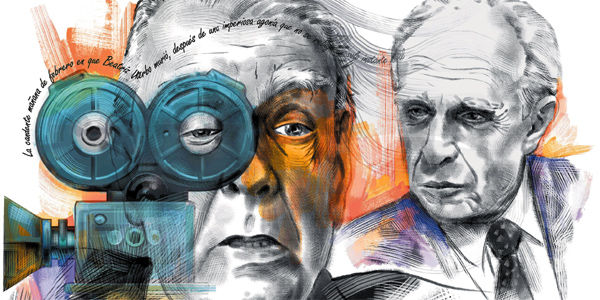(Art pulled from El Tiempo)
In response to The New York Times article “650 Prompts for Narrative and Personal Writing.”
306. “What Movies Do You Watch, or Reference, Over and Over?”
Cinema is an art form meant to be enjoyed in groups, and referenced thereafter.
Music can bring us back to a specific moment in our lives, like the scent of a long lost perfume, or the smell of a old bedroom. Its power rests in its play with time. We all experience time in one way or the other, but when listening to the exact same song, with its specific tempo, we experience it together, and exactly the same. Plastic arts are themselves a reference, either to a physical form, or an abstract concept. Always in relation are the sculpture, the sculptor, and the form referenced. With visual arts, similarly, which also rely on a model or an image, the style employed is usually a reference to a previous artist, even in the most extreme forms of abstract art, and thus becomes fodder for a next generation. What ties these arts together is, not only that are they references to and for artists, but they provide a reference for the general public. They are enjoyed in venues.
Poetry, on the other hand, is a singularly individual creation (yes, words are borrowed, but are we to argue thoughts aren’t our own? Let us table that conversation, for now). It can captivate the sensibilities of a reader, and give us the words and lines to handle the unintelligible elements of our lives. Yet it is highly quotable in public, and as Borges once said, “Truly fine poetry must be read aloud.” Same goes for song lyrics (which is poetry, guys, c’mon). Prose, however, is the trickiest, because its best moments happen when we are curled up in our bed, or under a far away yet visible tree, smiling to ourselves at a witty line of dialogue, or brushing off a loose tear at the end of a shudder due to a tragic scene portrayed just enough on the page to get the idea. We are alone in reading, and alone in our thoughts, and alone in the toil of another human. Perhaps we manage to internalize a line or two from a book, but at that point we might as well have read them in a poem, and not in a long line of argument or narrative scene. (The main difference with poetry, though, is that with prose you are lost in a world continuously, whereas poetry is marked by the break: line break, stanza break, or page break in the case of reading a collection of poems, as opposed to the section or chapter break found in stories.) How difficult it is to reference prose. We don’t all read the same books. We don’t all read the same way. Certainly, we don’t all read as much as we should. This makes reference in literature difficult. You need the book in your hand, and a handful of margin notes to reference a novel effectively in a group. Movies, in contrast — getting to the point now — are memorable in their own right. We watch them over and over and over. Sometimes alone, but mostly with friends, late at night to fall asleep, or the middle of the day to pass our lunch, or Saturday afternoon for those 3-hour epics. The fact that whole crews assemble a film signals it is as much a collective experience to consume as it is a collective act to create.
Off the top of my head, in random order, the most quoted and rewatched movies for me are:
The Big Lebowski — itself a movie full of internal references — “That creep can roll, man.”
American Psycho — for its one-liners — “I’m not going without a fucking reservation!”
A Clockwork Orange — for framing the possibility to make a movie symmetrical, psychological, and timeless — “Little Alex, my boy…”
Any Gaspar Noé film — which have each implanted themselves in me, one at a time, and are unforgettable for the best and worst reasons — “Love Hotel” here was on my mind, the image — why? — for the longest time. Then Noé used the prop in his following movie. When it showed up, I cringed as much as I cringed during the inner genital scenes (please see Love, 2015)
My favorite director is Richard Linklater. I’ve watched his films many times, over and over, and referenced them, the scenes and lines, to myself, and to friends, and to strangers on a train. His works not only capture life, then, but manifest it. I’ve acted and thought differently because of his movies.
If truly fine poetry must be read aloud, for the enjoyment of all, then truly fine movies must be watched over and over, for the references in them that might guide our lives.




